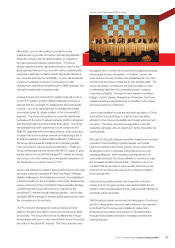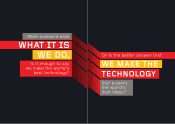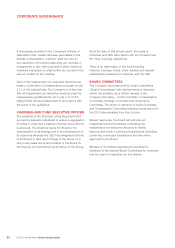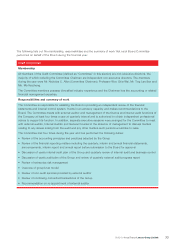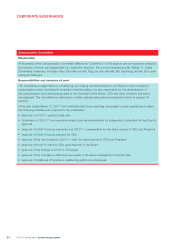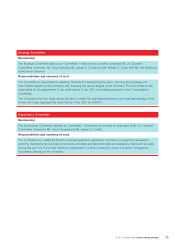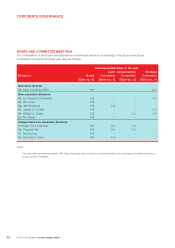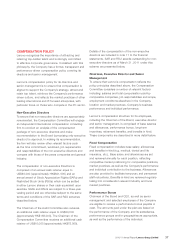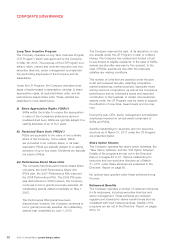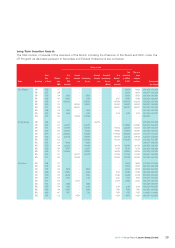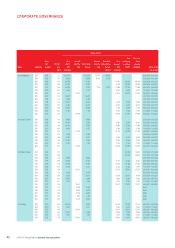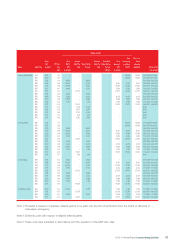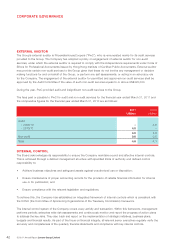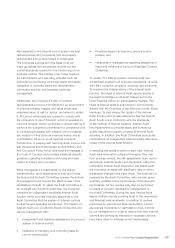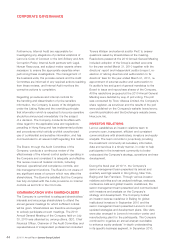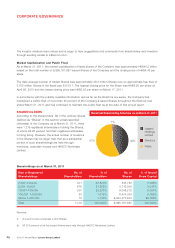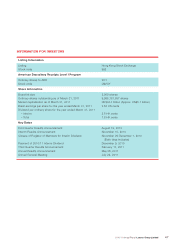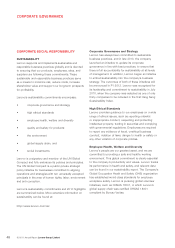Lenovo 2011 Annual Report Download - page 35
Download and view the complete annual report
Please find page 35 of the 2011 Lenovo annual report below. You can navigate through the pages in the report by either clicking on the pages listed below, or by using the keyword search tool below to find specific information within the annual report.2010/11 Annual Report Lenovo Group Limited
38
CORPORATE GOVERNANCE
Long-Term Incentive Program
The Company operates a Long-Term Incentive Program
(“LTI Program”) which was approved by the Company
on May 26, 2005. The purpose of the LTI Program is to
attract, retain, reward and motivate executive and non-
executive directors, senior management and selected
top-performing employees of the Company and its
subsidiaries.
Under the LTI Program, the Company maintains three
types of equity-based compensation vehicles: (i) share
appreciation rights, (ii) restricted share units, and (iii)
performance-based share units. These vehicles are
described in more detail below.
(i) Share Appreciation Rights (“SARs”)
SARs entitle the holder to receive the appreciation
in value of the Company’s share price above a
predetermined level. SARs are typically subject to a
vesting schedule of up to four years.
(ii) Restricted Share Units (“RSUs”)
RSUs are equivalent to the value of one ordinary
share of the Company. Once vested, RSUs
are converted to an ordinary share, or its cash
equivalent. RSUs are typically subject to a vesting
schedule of up to four years. Dividends are typically
not paid on RSUs.
(iii) Performance Based Share Units
The Company has three performance based share
unit plans, the 2005 Performance Share Unit
(PSU) plan, the 2007 Performance RSU plan and
the 2008 Performance RSU. The 2005 PSU plan
was discontinued in 2006 however, the Company
continues to honor grants previously awarded. All
outstanding awards vested completely on May 1,
2008.
The Performance RSU plans have been
discontinued; however, the Company continues to
honor grants previously awarded. All outstanding
awards vest completely by June 1, 2012.
The Company reserves the right, at its discretion, to pay
any awards under the LTI Program in cash or ordinary
shares. The Company has created and funded a trust
to pay shares to eligible recipients. In the case of SARs,
awards are due after exercise by the recipient. In the
case of RSUs, awards are due after the employee
satisfies any vesting conditions.
The number of units that are awarded under the plan
is set and reviewed annually, reflecting competitive
market positioning, market practices, especially those
among Lenovo’s competitors, as well as the Company’s
performance and an individual’s actual and expected
contribution to the business. In certain circumstances,
awards under the LTI Program may be made to support
the attraction of new hires. Award levels and mix may
vary.
During the year, CEO, senior management and selected
employees received an annual award comprised of
SARs and RSUs.
Awards outstanding for executive and non-executive
directors as of March 31, 2011 under the LTI Program
are presented below.
Share Option Scheme
The Company operates two share option schemes, the
“New Option Scheme” and the “Old Option Scheme”.
Details of the programs are set out in the Directors’
Report on pages 58 to 61. Options outstanding for
executive and non-executive directors as of March
31, 2011 under these schemes are presented in the
Directors’ Report on page 60.
No options were granted under these schemes during
the year.
Retirement Benefits
The Company operates a number of retirement schemes
for its employees, including executive directors and
senior management. These schemes are reviewed
regularly and intended to deliver benefit levels that are
consistent with local market practices. Details of the
programs are set out in the Directors’ Report on pages
68 to 70.


